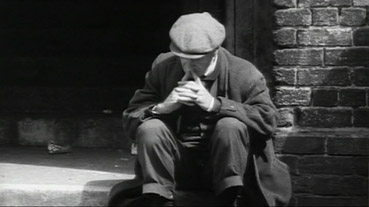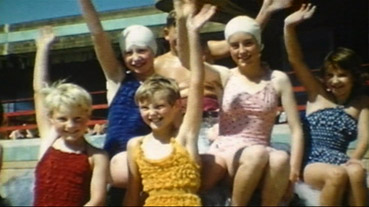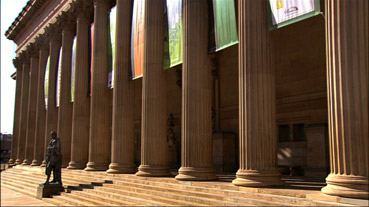|
I sometimes wonder which direction my artistic development might have taken had I formed a relationship with the district of my childhood. I've lost count of the writers and filmmakers whose work has been shaped and inspired by where they grew up, from Dennis Potter's beloved Forest of Dean to the Sheffield council estates that still fire the work of Shane Meadows. But apart from being located far enough from the homes of my friends to implant in me a long-lasting fondness for isolation, I remain to this day indifferent not just to the village in which I spent my formative years, but just about everywhere I've lived since. Of course, not being born in a city doesn't help – it's hard to have that seemingly necessary love/hate relationship with an Essex village that's on the verge of mutating into a town to serve the M25 and the corporate satellites that orbit it. Thus I didn't hate the place enough to flee at a prematurely early age, nor develop enough of a fondness to give it more than a passing thought after I left. And if art grows out of emotion and conflict, I was one key element shy of the full pack from the start.
Not so Terence Davies, who was born into a large family in a Liverpool slum. Not that you'd know it if you bumped into him and exchanged plesantries, as his accent is more suggestive of upper-middle class rural England than the working class North (I had always assumed this was shaped by his training as an actor, but in the making-of documentary on this disc he assures us it's how he has always spoken, another element that contributed to his outsider status). But if you've seen his early films – and if you're at all interested in British cinema then you should have – then you'll already have clear picture of his Liverpool upbringing, which he explored in captivating detail in his first two features, The Long Day Closes and Distant Voices, Still Lives. His move away from the autobiographical with Neon Bible and House of Mirth saw the previously rapturous critical response cool just a little, after which even getting a project off the ground proved such a problem that for eight years you could be forgiven for thinking he had retired from filmmaking altogether.

Of Time and the City is what is sometimes called a personal documentary, a strain of the genre in which the story is told through the eyes, experience and viewpoint of the filmmaker or reporter, a subjective approach that can be considered neither absolute nor objective. This is Liverpool and Britain and even the world beyond specifically as experienced and viewed by Terence Davies, something we are clued into from the start by his first-person narration and repeated references to his own childhood and family. It's an entrancing collage created almost exclusively from archive footage, the continuity and glue for which is provided by Davies's extraordinary narration. Davies doesn't simply deliver the voice-over, he performs it, an exquisitely written autobiographical one-man show in which quoted texts are blended with memory and opinion and given full expression through their animated and often deliciously witty delivery. From the opening lines, the story of the city's development is inextricably entwined with his own, its churches a focus for pious religious devotion that he later angrily rejects, its streets a breeding place for boredom that could be broken by a magical trip to the seaside, its changing architecture a cause for personal despair.
His delivery is both intimate and quietly commanding. Intermittently he seems to lean into the microphone to emphasise particular words as if rasping them in our ear, with his pronounciation of the term "Ano Domini" almost inviting a search for hidden meaning. His slight change of tone when ending a list of football club names with "Queen of the South" can't help seem a sly reference to his own homosexuality, one that is immediately developed with an entendre-laced 'Julian and Sandy' sketch from Round the Horn. This is followed by the true story of two gay men who are sentenced by a judge who provides his own extraordinary punch line, and a tale of 'dark desires' experienced at wrestling matches. It's a strain that intermittently resurfaces and is at its most wittily suggestive when he says of the Grand National, "Even Mum opened her purse for her annual little flutter and said, 'I really fancy Quare Times...each way!'" I'm sure I wasn't the only one who stopped laughing just in time to discover that not only was this a real Grand National runner, but that it won the 1955 race. Intermittently the prose gives way to amusing assaults on those whom Davies still holds in the deepest contempt, as his dismisses the Coronation as "The Betty Windsor Show", and almost spits with anger when comparing the money wasted on it to the daily hardship of those living in "some of the worst slums in Europe."

For all its peotry and wit, this is a film dripping with nostalgia for a time that has long since vanished, evidenced in the director's openly expressed fondness for music, architecture and even a way of life that have been all but obliterated by the uncultured curse of modernism in all its guises. Some of the targets are obvious if legitimate – municipal housing is showcased at its ugliest and most decrepit – while others are more surprising, with The Beatles, the city's most famous export, appearing only fleetingly to be mocked for their music and for looking more like a firm of provincial solicitors. The less charitable might go as far as to suggest that Davies is living in the past and that the film is an artistic expression of the 'when I was a lad...' view of modern Britain. A degree of balance is provided by the archive images of the sort of real poverty and hardship that Davies himself experienced, though it's infused with an almost mythic quality by the music that accompanies it (Branseti's Priveghiati si va Rugat). At the film's start, Davies tells us that "We love the place we hate, then hate the place we love. We leave the place we love, then spend a lifetime trying to regain it." But is it the place or a specific image of it trapped in his memory? The closing scenes suggest the latter, as Davies mourns the Liverpool that once was: "Where oh where are you, the Liverpool I knew and loved? Where have you gone without me? And now I'm an alien in my own land." It's a little ironic, perhaps, that the new Liverpool that Davies no longer feels able to connect with was instrumental in co-funding this very lament through its status as a 2008 European City of Culture.
But does any of this matter? Not a jot. Personal documentaries are not about objectivity, nor should they be, and are almost designed to reveal as much about their makers as they do about their chosen area of investigation. Davies has stated that he always intended the film as a purely subjective essay, "a celebration of the Liverpool that's in my heart" rather than a factual history and it's all the richer for it, a poetic rather than statistical study that's as much about memory, growing up, and Davies himself as it is about the city. Not everything works as perfectly as intended – the often gorgeous marrying of music and imagery sometimes leans a bit too heavily towards the wistful or the self-consciously ironic, and the case against municipal housing is overstated at some length. But for the most part this is a delightful cinema, an often sublime blend of archive footage, photographs, radio broadcasts, audio recordings and freshly shot material, with not a post-modernist visual tick in sight. Coupled with Davies's entrancing narration, it makes for a very special personal documentary that really is quite unlike any other you're likely to have seen or heard.
Accurately judging the picture quality of any film made up primarily of archive footage is always tricky, but if you use the newly shot daytime video material of the towering columns of The George's Hall as a reference point then we're looking at a close to pristine transfer, one presumably sourced directly from a digital master (there was no film print available for our cinema screening). The archive footage varies from clip to clip, with grain, detail and dirt levels variable enough to make it feel part of the film's chosen aesthetic. The image is framed 1.78:1 and is anamorphically enhanced.

The Dolby 2.0 stereo track is handsomely recorded and mixed, boasting a fabulous clarity and dynamic range and very distinct separation, evident in everything from the music tracks to the in-sharp crackle of a bonfire. Lovely.
A special mention should go to the hard-of-hearing subtitles, which not only appear on all of the extras as well as the main feature, but most helpfully identify each of the musical pieces by title and composer or singer.
The Making of Of Time and the City (45:37)
Not a behind-the-scenes piece but a retrospective look at how the film came to be, constructed from newly shot interviews with Terence Davies, producers Roy Boulter and Sol Papadopoulos, and archive producer Jim Anderson. Visually, there's not much variance, but the interviewees themselves and the tales they tell are all interesting enough to make provide a compelling 45 minutes of chat. Davies in particular, interviewed here by critic Geoff Andrew, delivers some very useful background on his approach to the project, on his hostile view of the monarchy and the church, and of the process of constructing the film and obtaining the required footage and music tracks, something Boulton, Papadopoulos and Anderson also contribute well to.
Listen to Britain (19:09 plus 1:19 intro)
Davies provides a seductive introduction to this 1942 film by Humphrey Jennings and Stewart McAllister, a work he describes as "the first great visual poem" and "one of the greatest things that this country has actually produced." It's a daunting build-up for what is in essence a morale-boosting wartime propaganda piece whose prime purpose was presumably to highlight elements that define our national identity and what we stood to lose should the feared Nazi invasion actually took place. But it's still a spellbinding piece, eschewing narrative and narration in favour of the imagery and particularly sounds and music of everyday life, whether they be the overhead roar of Spitfires, the chug of a train or the singing of troops within, the chimes of Big Ben, the music and movement of the dance floor, schoolchildren at play, the gentle movement of leaves in the wind, the churn of factory machinery, or a musical performance by Dame Myra Hess or Flanagan and Allen. Patriotic finale aside, it never overstates its case and is disarmingly modern it its filmmaking and the naturalism of the participants, and the influence on Davies's film is clear. It's also, despite some remaining dust and damage, in astonishingly good shape, boasting a contrast and sharpness that add to its sense of cinematic modernity.
Q&A with Terence Davies (19:06)
Davies answers questions about the film from interviewer Bill Lawrence and an audience at a Q&A at the Cambridge Arts Picturehouse. There's inevitably some crossover with the Making Of video, but there's still plenty of new stuff here, and what really comes across is Davies's phenomenal passion for the arts, something the performer in him can't help but respond to.
Trailer (2:12)
An unfussy trailer with a couple of adoring critical quotes.
Booklet
A nicely produced accompanying booklet containing an essay on the film by Matthew Gandy, a gush of a piece by Jason Wood, an interesting article by photographer Bernard Fallon (some of whose photographs were used in the film), a look at Davies's cinema by Geoff Andrew, a biography of the director from Screen Online, credits for the film, and some quality stills.
A witty, fascinating and moving blend of documentary and self-portrait that's been given exemplary treatment on this BFI DVD, which boasts a top-notch transfer and some excellent extra features – the retrospective interviews and Listen to Britain are especially welcome. I seem to have been saying this a lot recently, but this has to come highly recommended, except maybe to ardent modernists and those with a genuine phobia for nostalgia and times past.
|